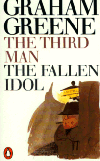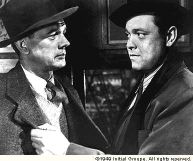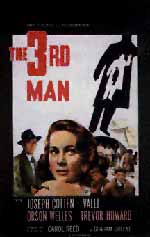|

Homepage
Biography
Bibliography
Criticisms
On Writing
A Gun for Sale
Brighton Rock
The Confidential Agent
The Power and the Glory
The Heart of the Matter
The Third Man
The End of the Affair
The Quiet American
Our Man in Havana
A Burnt-Out Case
The Comedians
Travels With My Aunt
The Honorary Consul
The Human Factor
Quiz
Links
|
Graham
Greene on The Third Man:  My film story, The Third Man, was
never written to be read but only to be seen. The story,
like many love affairs, started at a dinner table and
continued with headaches in many places: Vienna,
Ravello, London, Santa Monica. My film story, The Third Man, was
never written to be read but only to be seen. The story,
like many love affairs, started at a dinner table and
continued with headaches in many places: Vienna,
Ravello, London, Santa Monica.
…long before, on the flap
of an envelope, I had written an opening paragraph:
"I had paid my last farewell to Harry a week ago,
when his coffin was lowered into the frozen February
ground, so that it was with incredulity that I saw him
pass by, without a sign of recognition, among the host of
strangers in the Strand." I, like my hero, had not
the least inkling of an explanation, so when Alexander
Korda over dinner asked me to write a film for Carol Reed — to follow our Fallen Idol
which I had adapted from my short story "The
Basement Room" a year before—I had nothing more
to offer him except this paragraph, though what Korda
really wanted was a film about the Four-Power occupation
of Vienna.
 On the continuity and the story-line
Carol Reed and I worked closely together when I came back
with him to Vienna to write the screenplay, covering
miles of carpet a day, acting scenes at each other. (It's
a curious fact that you cannot work out a continuity at a
desk—you have to move with your characters.)…To
the novelist, of course, his novel is the best he can do
with a particular subject; he cannot help resenting many
of the changes necessary for turning it into a film play;
but The Third Man was never intended to be more
than the raw material for a picture. The reader will
notice many differences between the story and the film,
and he should not imagine these changes were forced on an
unwilling author: as likely as not they were suggested by
the author. The film in fact is better than the story
because it is in this case the finished state of the
story. On the continuity and the story-line
Carol Reed and I worked closely together when I came back
with him to Vienna to write the screenplay, covering
miles of carpet a day, acting scenes at each other. (It's
a curious fact that you cannot work out a continuity at a
desk—you have to move with your characters.)…To
the novelist, of course, his novel is the best he can do
with a particular subject; he cannot help resenting many
of the changes necessary for turning it into a film play;
but The Third Man was never intended to be more
than the raw material for a picture. The reader will
notice many differences between the story and the film,
and he should not imagine these changes were forced on an
unwilling author: as likely as not they were suggested by
the author. The film in fact is better than the story
because it is in this case the finished state of the
story.
One of the few major disputes
between Carol Reed and myself concerned the ending and he
was  proved triumphantly right. I held the
view that an entertainment of this kind was too light an
affair to carry the weight of an unhappy ending. Reed on
his side felt that my ending — indeterminate as it
was, with no words spoken, Holly joining the girl in
silence and walking away with her from the cemetery where
her lover Harry was buried — would strike the
audience who had just seen Harry's death and burial as
unpleasantly cynical. I was only half convinced: I was
afraid few people would wait in their seats during the
girl's long walk from the graveside towards Holly, and
the others would leave the cinema under the impression
that the ending was still going to be as conventional as
my suggested ending of boy joining girl. I had not given
enough credit to the mastery of Reed's direction, and at
that stage, of course, we neither of us anticipated
reed's discovery of Anton Karas, the zither player. All I
had indicated in my treatment was a kind of signature
tune connected with Lime. proved triumphantly right. I held the
view that an entertainment of this kind was too light an
affair to carry the weight of an unhappy ending. Reed on
his side felt that my ending — indeterminate as it
was, with no words spoken, Holly joining the girl in
silence and walking away with her from the cemetery where
her lover Harry was buried — would strike the
audience who had just seen Harry's death and burial as
unpleasantly cynical. I was only half convinced: I was
afraid few people would wait in their seats during the
girl's long walk from the graveside towards Holly, and
the others would leave the cinema under the impression
that the ending was still going to be as conventional as
my suggested ending of boy joining girl. I had not given
enough credit to the mastery of Reed's direction, and at
that stage, of course, we neither of us anticipated
reed's discovery of Anton Karas, the zither player. All I
had indicated in my treatment was a kind of signature
tune connected with Lime.
from Ways of Escape,
pp.103-105
© Melody Yiu
Email me: greeneland -at- gmail . com
Images and quoted text on this
website may be protected by U.S. and international
copyright laws. They are presented here for academic
interest and personal entertainment. No distribution,
reproduction, re-transmission or other rights are given
or implied by their appearance. If you have any copyright
concerns, please notify me.
|
 My film story, The Third Man, was
never written to be read but only to be seen. The story,
like many love affairs, started at a dinner table and
continued with headaches in many places:
My film story, The Third Man, was
never written to be read but only to be seen. The story,
like many love affairs, started at a dinner table and
continued with headaches in many places:  On the continuity and the story-line
Carol Reed and I worked closely together when I came back
with him to Vienna to write the screenplay, covering
miles of carpet a day, acting scenes at each other. (It's
a curious fact that you cannot work out a continuity at a
desk—you have to move with your characters.)…To
the novelist, of course, his novel is the best he can do
with a particular subject; he cannot help resenting many
of the changes necessary for turning it into a film play;
but The Third Man was never intended to be more
than the raw material for a picture. The reader will
notice many differences between the story and the film,
and he should not imagine these changes were forced on an
unwilling author: as likely as not they were suggested by
the author. The film in fact is better than the story
because it is in this case the finished state of the
story.
On the continuity and the story-line
Carol Reed and I worked closely together when I came back
with him to Vienna to write the screenplay, covering
miles of carpet a day, acting scenes at each other. (It's
a curious fact that you cannot work out a continuity at a
desk—you have to move with your characters.)…To
the novelist, of course, his novel is the best he can do
with a particular subject; he cannot help resenting many
of the changes necessary for turning it into a film play;
but The Third Man was never intended to be more
than the raw material for a picture. The reader will
notice many differences between the story and the film,
and he should not imagine these changes were forced on an
unwilling author: as likely as not they were suggested by
the author. The film in fact is better than the story
because it is in this case the finished state of the
story. proved triumphantly right. I held the
view that an entertainment of this kind was too light an
affair to carry the weight of an unhappy ending. Reed on
his side felt that my ending — indeterminate as it
was, with no words spoken, Holly joining the girl in
silence and walking away with her from the cemetery where
her lover Harry was buried — would strike the
audience who had just seen Harry's death and burial as
unpleasantly cynical. I was only half convinced: I was
afraid few people would wait in their seats during the
girl's long walk from the graveside towards Holly, and
the others would leave the cinema under the impression
that the ending was still going to be as conventional as
my suggested ending of boy joining girl. I had not given
enough credit to the mastery of Reed's direction, and at
that stage, of course, we neither of us anticipated
reed's discovery of Anton Karas, the zither player. All I
had indicated in my treatment was a kind of signature
tune connected with Lime.
proved triumphantly right. I held the
view that an entertainment of this kind was too light an
affair to carry the weight of an unhappy ending. Reed on
his side felt that my ending — indeterminate as it
was, with no words spoken, Holly joining the girl in
silence and walking away with her from the cemetery where
her lover Harry was buried — would strike the
audience who had just seen Harry's death and burial as
unpleasantly cynical. I was only half convinced: I was
afraid few people would wait in their seats during the
girl's long walk from the graveside towards Holly, and
the others would leave the cinema under the impression
that the ending was still going to be as conventional as
my suggested ending of boy joining girl. I had not given
enough credit to the mastery of Reed's direction, and at
that stage, of course, we neither of us anticipated
reed's discovery of Anton Karas, the zither player. All I
had indicated in my treatment was a kind of signature
tune connected with Lime.